First man in Britain receives pioneering lung cancer vaccine – amid worrying rise of disease in young, never-smokers
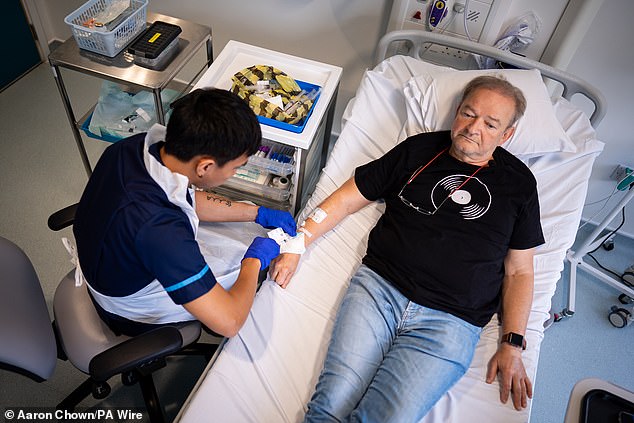
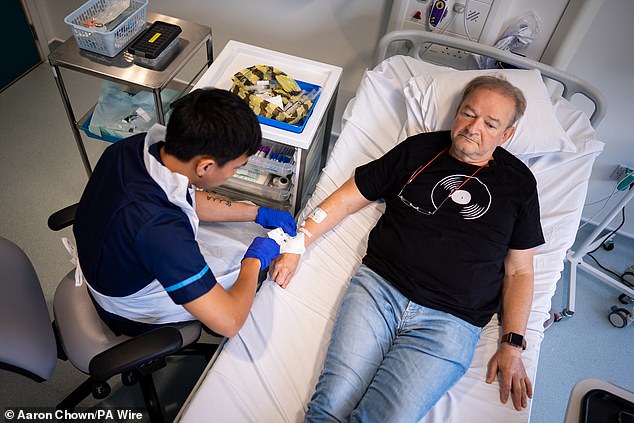
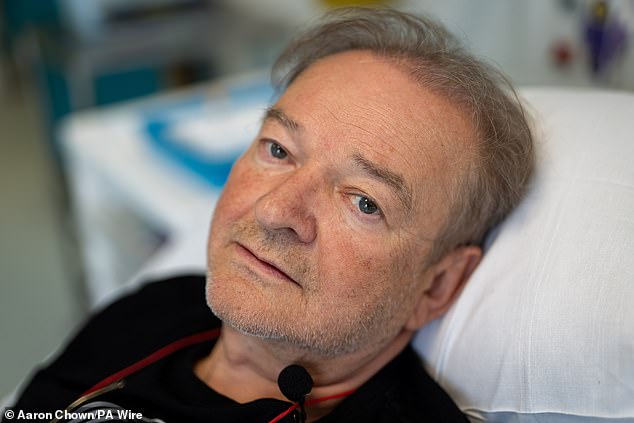

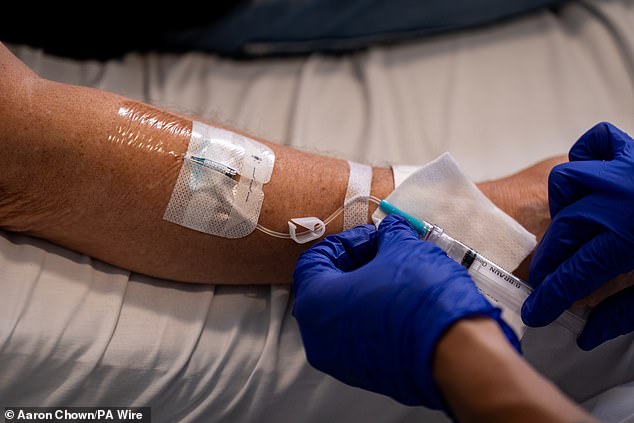

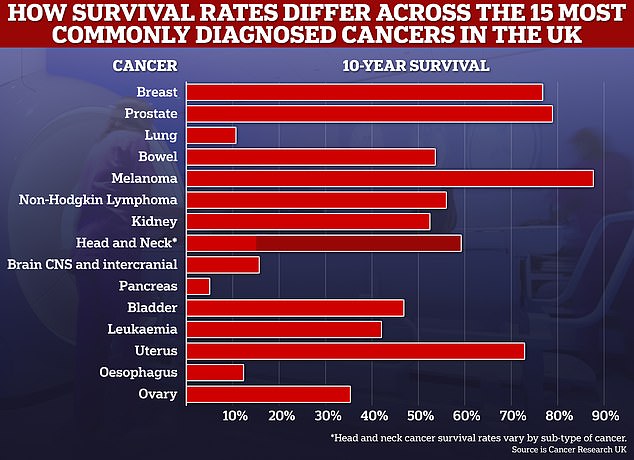
A man whose deadly lung cancer was discovered ‘by coincidence’ has become the first in the UK to receive a ‘game-changing’ vaccine.
Janusz Racz, from London, was given a heartbreaking diagnosis of just four to five months to live in May after the disease was spotted during a colonoscopy.
Told chemotherapy and radiotherapy would only give the scientist, 67, a 35 per cent chance of surviving over five years, he then opted to take part in a pioneering trial of the jab.
The vaccine, codenamed BNT116, is made by BioNTech using the same mRNA technology that underpinned its highly effective Covid jab.
Doctors believe the treatment — which is custom built for patients to stop their cancer returning — will herald a new era in fighting the disease.

Janusz Racz, from London , was given a heartbreaking diagnosis of just four to five months to live in May after the disease was spotted during a colonoscopy

Told chemotherapy and radiotherapy would only give the scientist, 67, a 35 per cent chance of surviving over five years, he then opted to take part in the pioneering trial
Designed to treat non-small cell lung cancer (NSCLC), the most common form of the disease, they say it is far more precisely targeted than chemotherapy.
This means it shouldn’t have the same collateral damage on healthy cells that sometimes causes overwhelming side effects.
Mr Racz received six injections, five minutes apart at University College London Hospital (UCLH) on Tuesday.
Each jab contained different RNA strands.
He will now get the vaccine every week for six weeks, before receiving at at three week intervals over 54 weeks.
Recalling his diagnosis he said: ‘I was scheduled for a colonoscopy and my blood pressure was too high, so the doctor decided to send me for a CT colonoscopy.
‘It was the middle of February when they detected something on my lung, my right lung.’
Urgent tests confirmed he had lung cancer, which strikes around 50,000 people in the UK and 230,000 in the US every year.
‘The chemotherapy was particularly challenging, I really wouldn’t want to have that again,’ Mr Racz said.
Told about the trial and ‘how it was different to the treatment I had recently completed’, he ‘decided to take part because I hope it will provide a defense against cancer cells’.
He added: ‘I am a scientist too, and I understand that the progress of science — especially in medicine — lies in people agreeing to be involved in such investigations.
‘I can be a part of the team that can provide proof of concept for this new methodology, and the faster it would be implemented across the world, more people will be saved.’
Mr Racz was highly active before he became ill, climbing several mountains and running marathons in seven countries.
He said: ‘I think that after the treatment, I will get back, I will be stronger. My dream is just to run maybe more marathons.
‘I have never had the opportunity to run a London Marathon because it’s a lottery, and maybe it would be a possibility to run the marathon as a member of this programme.’
The trial will take place across 34 research sites in seven countries, with six located in England and Wales.
Overall, it is hoped about 130 lung cancer patients will be enrolled, 20 of whom will be based in the UK.

Mr Racz received six injections, five minutes apart at University College London Hospital (UCLH) on Tuesday. Each jab contained different RNA strands. He will now get the vaccine every week for six weeks, before receiving at at three week intervals over 54 weeks

Mr Racz was highly active before he became ill, climbing several mountains and running marathons in seven countries. He said: ‘I think that after the treatment, I will get back, I will be stronger. My dream is just to run maybe more marathons’
Professor Siow Ming Lee, a consultant medical oncologist at UCLH, which is leading the trial in the UK, said: ‘This technology has moved on incredibly fast.
‘It’s simple to deliver, and you can select specific antigens in the cancer cell, and then you target them.’
The phase one clinical trial is the first in human study of BNT116, which will be given to lung cancer patients alongside standard immunotherapy.
‘Immunotherapy has made a big progress, especially in lung cancer,’ Prof Lee added. ‘But it still doesn’t treat all lung cancer patients successfully.
‘We know it’s well tolerated for our Covid vaccine patients, so we hope it will be well tolerated for cancer patients.
He added: ‘We hope to go on to phase two, phase three, and then hope it becomes standard of care worldwide and saves lots of lung cancer patients.
‘We have to try to push the boundary, and we’ve been pushing here for the last 30 to 40 years now. It’s a privilege to be involved in lung cancer research.’
In July 2023, the Government signed an agreement with BioNTech to provide up to 10,000 patients with precision cancer immunotherapies by 2030.
Lung cancer is the world’s biggest cancer killer. It is notoriously difficult to diagnose and often appears later when it’s harder to treat.
Figures show it kills four out of five patients within five years. Fewer than 10 per cent of people survive their disease for 10 years or more.
Despite the progress, a disparity among sexes is emerging, with women between the ages of 35 and 54 being diagnosed with lung cancer at higher rates than men in that same age group.

Symptoms of lung cancer are often not noticeable until the cancer has spread through the lungs, to other parts of the body

Cigarette smoking remains the leading cause of lung cancer.
However, the share of young patients with the disease, who have never smoked cigarettes is also growing.
Researchers believe that the way new homes are built may be exposing residents to a poisonous gas. They also say vaping and cannabis could be factors.
Unusually the clinical trial will include patients with early disease who have yet to undergo surgery or radiotherapy, as well as those who have cancer that has spread or returned.
It keeps options open on how best to use the vaccine to improve outcomes for people with cancer.
NHS England national cancer director Dame Cally Palmer said: ‘The NHS has a leading role globally in trialling cancer vaccines and if we are successful, they could be revolutionary in vaccinating people against their own cancers to prevent the cancer recurring after their initial treatment.
‘Pioneering work is being undertaken by hospitals throughout the country with their university and industry partners to look at ways of harnessing the body’s own immune system to treat a range of cancers.
‘A cancer diagnosis is very worrying, but access to groundbreaking trials – alongside other innovations to diagnose and treat cancers earlier – provides hope.
‘We expect to see thousands more patients taking part in trials over the next few years.’




